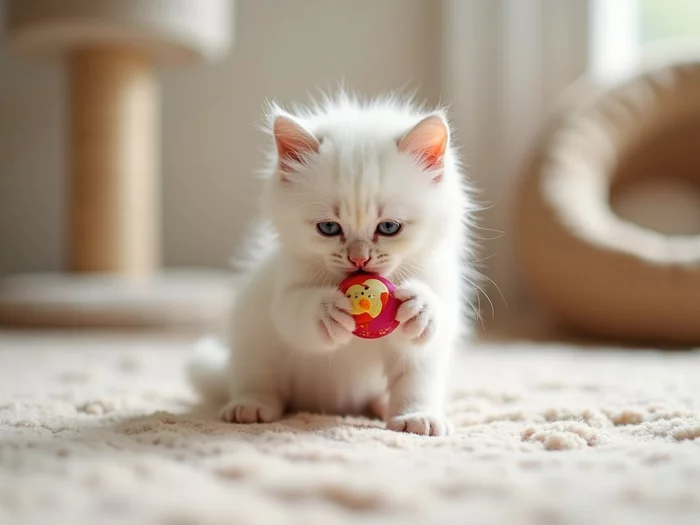0-3 Weeks: Newborn Phase
- Highly dependent on mother.
- Senses just developing.
- Focus on sleeping & nursing.
Ready to be the best kitten parent ever? Get expert tips, product reviews, and essential guides delivered straight to your inbox!
Posted on: 2025-11-16
By: Edyta Drabek
Early training is not just a phase; it's a cornerstone of a kitten's lifelong behavior and well-being. As you embark on this rewarding journey with your new furry friend, understanding the importance of age-based training can profoundly influence their development. Here’s an insightful overview of what every new kitten parent needs to know!
Understanding your kitten's growth through key stages is essential for effective training and building a strong bond. Each phase offers unique opportunities to introduce new skills and behaviors.
As a new kitten parent, you may be wondering why training your little furball is so important. Trust me, early training matters more than you might think! Fostering good habits and behaviors during those crucial early weeks sets the foundation for a well-adjusted adult cat. In this section, we'll explore how your kitten's development stages play a vital role in their training journey. Let's dive in!
Training your kitten isn't just about teaching them fun tricks; it's about establishing a strong bond and understanding between you two. Early training helps your kitten learn essential skills that will support their growth into a confident and secure adult cat. It can also prevent behavioral issues down the line, making life easier for both of you!
With early and consistent training, you're setting your kitten up for success in various aspects of their life. It's a win-win situation for you both!
Kittens go through several key growth stages, each with unique needs and behaviors. Understanding these stages is essential for tailoring your training approach. For a comprehensive overview of feline life stages, you can refer to the AAHA-AAFP Feline Life Stage Guidelines. Here’s a quick overview:
Each stage requires different types of training and environmental support. By aligning your training methods with your kitten's development, you can effectively nurture their growth! The Royal Canin Academy also provides valuable insights into feline developmental stages.
When it comes to training your kitten, positive reinforcement is the way to go! Using treats, toys, and praise, you can encourage your kitten to learn basic commands. Common commands to start with include:
These commands help establish you as the leader and create a respectful relationship. As you practice these basic commands, remember to keep sessions short and fun! Kittens have short attention spans, so the more engaging you make training, the better your results will be.
As you navigate your kitten's early months, understanding their monthly milestones can be a game-changer! Each month brings new developments and opportunities for training. Let’s break it down!
During the first three weeks, kittens are mostly dependent on their mother. Their senses are just beginning to develop, and they will rely heavily on her for warmth, nutrition, and socialization.
At this stage, your kitten will spend most of their time sleeping and nursing. It's crucial to allow them this time to grow and bond with their mother before stepping in. After all, they're still getting used to the world around them!
As your kitten enters this phase, they will start to explore their surroundings. This is an excellent time to start introducing the litter box. Kittens are naturally inclined to bury their waste, so placing them in the box after meals can help encourage this behavior!
It's important to expose your kitten to various environments, people, and other pets during this phase. This helps them develop social skills and boosts their confidence as they grow. Be patient, as each kitten has their own pace!
Providing a stimulating environment is key at this stage. Consider incorporating toys, scratching posts, and climbing structures that encourage exploration and play. Enrichment helps build their physical and mental skills.
By this age, your kitten should begin weaning from their mother’s milk. Gradually introduce them to high-quality kitten food in small amounts. Monitor their response and ensure they are adjusting well to the new diet!
Now’s the time to start with simple commands! Use the positive reinforcement techniques we discussed earlier, and keep training sessions short and playful. Your goal is to make learning an enjoyable experience for your kitten.
Every kitten has a unique personality. Take time to observe their behavior to tailor your training approach. Some kittens are more outgoing, while others may be shy. Adjust your methods to match their temperament for the best outcomes!
As your kitten grows, their play becomes more coordinated. Encourage interactive playtime, which not only helps them develop physical skills but also strengthens your bond!
Introducing your kitten to different experiences will continue to build their confidence. Invite friends over, take them for short car rides, or explore new environments. Every new experience is a chance to learn!
At this stage, some kittens might begin to experience separation anxiety. Gradually increase the time they spend alone, and provide them with engaging toys to keep them occupied. This will help ease their anxiety and foster independence.
As your kitten matures, you can introduce advanced training techniques like crate training and clicker training. Both methods help reinforce good behavior and provide structure, which is essential as they grow!
During this phase, you might encounter some common behavioral challenges. To address these, remain consistent with your training and provide plenty of positive reinforcement. If issues arise, don’t hesitate to troubleshoot with a professional if needed!
Finally, focus on behavior modification strategies to support your kitten's social skills. Encourage playdates with other kittens or friendly pets. This will help them learn proper social interactions and develop good manners! For further reading on the developmental stages of kittens, you may find this resource from Longmont Humane Society helpful.
Early training is crucial because it helps establish a strong bond and trust between you and your kitten, prevents behavioral issues from becoming ingrained habits, and sets the foundation for a well-adjusted, confident adult cat.
Kittens go through several stages: 0-3 weeks (Newborn), 4-6 weeks (Play & Curiosity), 7-9 weeks (Initial Training), 10-12 weeks (Confidence Building), and 3-6 months (Skill Refinement).
Positive reinforcement involves rewarding desired behaviors with treats, toys, or praise. It encourages your kitten to repeat good actions and makes training a fun, positive experience.
You can begin introducing the litter box around 4-6 weeks of age, as kittens start to explore their surroundings and have a natural inclination to bury their waste.
Introduce your kitten to various environments, people, and other friendly pets during their 4-6 week phase and continue through 10-12 weeks. Gradual exposure to new experiences builds their confidence and social skills.
For kittens 3-6 months old, you can introduce advanced techniques such as crate training and clicker training, which help reinforce good behavior and provide structure.
As you embark on your journey of training your kitten, we'd love to hear about your experiences! What challenges have you faced so far, and what successes have made you proud? Share your thoughts below:
As a passionate pet enthusiast, I can't stress enough how early training sets the stage for a well-behaved adult cat. When you invest time into training your kitten during their formative months, you're doing much more than just teaching them commands. You're actually shaping their personality and behavior for a lifetime! Just think about it—many adult cat behavioral issues stem from a lack of early socialization and training. So, let's dive into how you can positively influence your kitten's future.
When I welcomed my first kitten home, I was amazed at how much their early experiences shaped who they became as adults. With consistent training and socialization, you will find that your kitten grows into a confident and well-adjusted cat. Here are some key ways early training affects adult behavior:
It’s all about laying a solid foundation for your kitten. Remember, the sooner you start, the better their adult behavior will be!
When I think back to my experiences with kitten care, I remember how vital it was to encourage positive habits early on. Kittenhood is a crucial time for socialization, and you can help your furry friend develop essential skills. Here’s how to foster those skills:
By being proactive in encouraging positive habits, you’re raising a well-rounded and adaptable cat.
Let’s talk about playtime! Play is not just a fun activity; it’s also a key component of your kitten’s development. Engaging in play helps your kitten develop crucial skills in hunting, coordination, and social interaction. Here are some ways to make playtime effective:
As you observe your kitten playing, you’ll see them growing more confident and agile. Plus, it’s a great way to bond with them!
Here is a quick recap of the important points discussed in the article:

 As you embark on the journey of kitten parenting, understanding your little furball's nutritional ne
As you embark on the journey of kitten parenting, understanding your little furball's nutritional ne
 As you embark on the rewarding journey of kitten parenthood, understanding the significance of choos
As you embark on the rewarding journey of kitten parenthood, understanding the significance of choos
 Early training is not just a phase; it's a cornerstone of a kitten's lifelong behavior and well-bein
Early training is not just a phase; it's a cornerstone of a kitten's lifelong behavior and well-bein